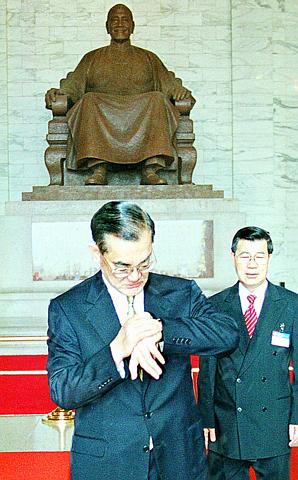Twelve legislators and 11 women were elected to the KMT's Central Standing Committee (CSC) yesterday but allegations persisted that the party's executive body continued to meddle in the elections.
Four former National Assembly deputies were also elected to CSC positions, giving more than half the seats to figures with a national profile. Ten were taken by former Cabinet members.
The election of 11 women members meant that the "protective quota" of 25 percent of CSC seats for women was exceeded.

PHOTO:LEE HUNG-MING, LIBERTY TIMES
In all, there are 18 new mem-bers, the other 13 being incumbents of the previous committee.
KMT Chairman Lien Chan (連戰) expressed satisfaction with the result, saying that it brought new hope to the party.
"With 31 members from various social levels and professional fields entering the CSC, the party will benefit from the input of a wide range of opinions in its policy-making process," Lien said.
He saw it as a milestone in the party's history that the CSC now includes 11 women. There were only three women on the previous CSC. Lien had nominated a vice-chairwoman on June 18, in a move interpreted as a symbol of the sincerity of the party's stated aim of promoting women.
He also said that the entrance of 12 lawmakers into the CSC was to be welcomed as likely to bring the party's policy-making machinery closer to public opinion.
Speaker of the Legislative Yuan Wang Jin-pyng (王金平) agreed with Lien, saying that the 12 lawmakers, who now occupy more than a third of CSC seats, would not fail to have their voices heard. There were five lawmakers in the previous CSC.
The first three to be elected to the new CSC were former Council for Economic Planning and Development chairman Chiang Ping-kun (江丙坤), former speaker of the National Assembly Chen Chin-jang (陳金讓) and female lawmaker Huang Chao-shun (黃昭順).
Yesterday's election was the first one in which all CSC positions had been open to a vote. About 80 Central Committee members were thus drawn into contention for the seats. A portion of vote-casting Central Committee members still complained about what they alleged was party meddling in the election.
"Despite the party executive's denial of involvement in efforts to influence the election, I have received a list of `designated' candidates. Why can't the party kick this bad habit?" said Chu Fong-chih (朱鳳芝), a female lawmaker who ran for a CSC seat but was defeated.
Wang Su-yun (王素筠) even accused party officials of lying, saying that their words did not match their deeds.
KMT secretary-general Lin Feng-cheng (林豐正) denied that the party had abused its power in order to influence results, saying that it had simply been "concerned" about certain candidates for whom it had engaged in "coordination" work.
"I also received at least three lists, the origins of which were unclear," Lin said.
He did admit, however, that the party had urged that certain candidates be elected, including Straits Exchange Foundation chairman Koo Chen-fu (辜振甫), chairman of the Chinese National Federation of Industries (中華民國全國工業總會) Kao Chin-yen (高清愿) and former Cabinet members Liu Chao-shiuan (劉兆玄)and Wang Chih-kang (王志剛).
All of these candidates were elected be comfortable margins yesterday.

The CIA has a message for Chinese government officials worried about their place in Chinese President Xi Jinping’s (習近平) government: Come work with us. The agency released two Mandarin-language videos on social media on Thursday inviting disgruntled officials to contact the CIA. The recruitment videos posted on YouTube and X racked up more than 5 million views combined in their first day. The outreach comes as CIA Director John Ratcliffe has vowed to boost the agency’s use of intelligence from human sources and its focus on China, which has recently targeted US officials with its own espionage operations. The videos are “aimed at

STEADFAST FRIEND: The bills encourage increased Taiwan-US engagement and address China’s distortion of UN Resolution 2758 to isolate Taiwan internationally The Presidential Office yesterday thanked the US House of Representatives for unanimously passing two Taiwan-related bills highlighting its solid support for Taiwan’s democracy and global participation, and for deepening bilateral relations. One of the bills, the Taiwan Assurance Implementation Act, requires the US Department of State to periodically review its guidelines for engagement with Taiwan, and report to the US Congress on the guidelines and plans to lift self-imposed limitations on US-Taiwan engagement. The other bill is the Taiwan International Solidarity Act, which clarifies that UN Resolution 2758 does not address the issue of the representation of Taiwan or its people in

US Indo-Pacific Commander Admiral Samuel Paparo on Friday expressed concern over the rate at which China is diversifying its military exercises, the Financial Times (FT) reported on Saturday. “The rates of change on the depth and breadth of their exercises is the one non-linear effect that I’ve seen in the last year that wakes me up at night or keeps me up at night,” Paparo was quoted by FT as saying while attending the annual Sedona Forum at the McCain Institute in Arizona. Paparo also expressed concern over the speed with which China was expanding its military. While the US

SHIFT: Taiwan’s better-than-expected first-quarter GDP and signs of weakness in the US have driven global capital back to emerging markets, the central bank head said The central bank yesterday blamed market speculation for the steep rise in the local currency, and urged exporters and financial institutions to stay calm and stop panic sell-offs to avoid hurting their own profitability. The nation’s top monetary policymaker said that it would step in, if necessary, to maintain order and stability in the foreign exchange market. The remarks came as the NT dollar yesterday closed up NT$0.919 to NT$30.145 against the US dollar in Taipei trading, after rising as high as NT$29.59 in intraday trading. The local currency has surged 5.85 percent against the greenback over the past two sessions, central